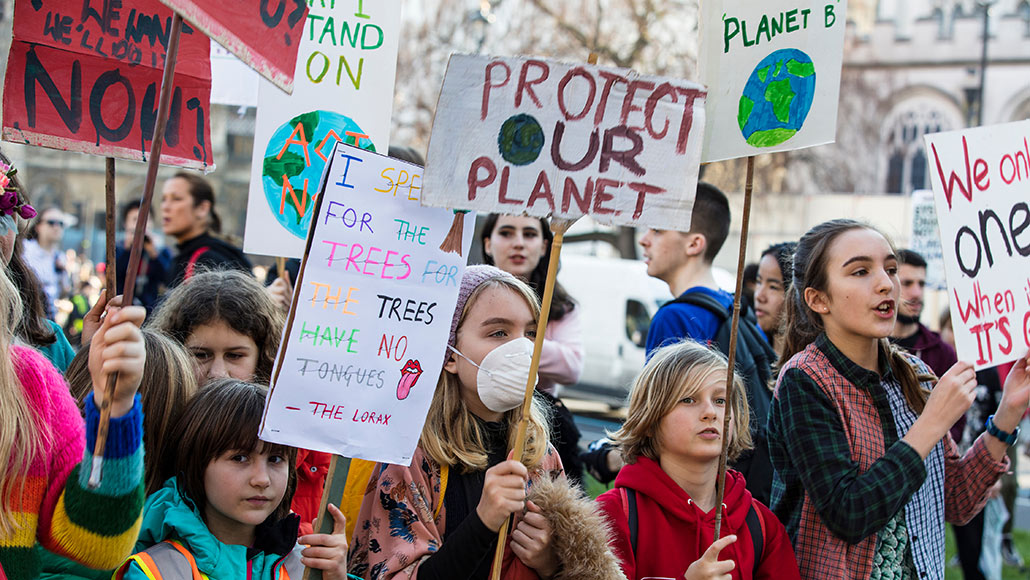
Signers to the 2015 Paris climate treaty agreed to lower greenhouse gas emissions to keep global warming to well below 2 degrees Celsius. But nations’ current pledged cuts are nowhere near enough to make that target, a U.N. report says.
Ink Drop/Shutterstock
The world is way behind on its commitment to reduce greenhouse gas emissions — and nations need to act immediately if they want to stave off the worst effects of climate change, an international study finds.
Humans must reduce emissions by 2.7 percent each year from 2020 to 2030 just to achieve the goal set by the 2015 Paris Agreement of limiting global warming to 2 degrees Celsius above preindustrial times by 2100. That’s the conclusion of the 2019 emissions gap report released by the U.N. Environment Programme, or UNEP, on November 26. The report, the 10th such annual report released by the UNEP, analyzes the gap between global greenhouse gas emissions and how much the world needs to reduce those emissions to avoid the worst consequences of climate change.
To limit warming to 1.5 degrees Celsius — a more stringent goal but one that studies show would result in fewer life-threatening climate extremes, less sea level rise and fewer species lost (SN: 10/7/18) — nations would have to reduce emissions by 7.6 percent each year during the next decade, the report finds.
“Each year, the report has found that the world is not doing enough,” Inger Andersen, UNEP executive director, writes in a foreword to the 2019 report. “The size of these annual cuts may seem shocking, particularly for 1.5° C. They may also seem impossible, at least for next year. But we have to try.”
This year’s report comes at a particularly significant time, as nations consider how much they will pledge to reduce greenhouse gas emissions by December 2020, a deadline set by the Paris Agreement.
Originally 195 nations, including the United States, agreed to reduce their greenhouse gas emissions sufficiently to limit warming to “well below” 2 degrees Celsius (SN: 12/12/15). The future of the United States’ participation in the treaty remains in limbo: President Donald Trump has begun proceedings that would withdraw the country from the treaty by November 4, 2020.
Countries’ current pledges to reduce emissions are nowhere near enough to achieve even the 2-degree target, the UNEP report finds. Even if all of those contributions are implemented, the world would still warm by 3.2 degrees C (5.8 degrees Fahrenheit) by 2100.
Meanwhile, the report notes, greenhouse gas emissions continue to rise rather than fall. Over the last decade, total greenhouse gas emissions rose 1.5 percent per year, hitting a new high in 2018 of 55.3 metric gigatons of “carbon dioxide equivalent,” in which the total mass of the gases has the atmospheric warming potential of that much carbon dioxide.
Previous studies have found that carbon dioxide emissions from existing power plants and vehicles, as well as plants that are planned or under construction, could already be high enough by midcentury to increase global average temperatures to 1.5 degrees C (SN: 7/1/19).
It may still be possible to bring global temperatures down again by 2100, with the help of negative emissions technologies, which can remove carbon dioxide from the atmosphere (SN: 12/17/18). But it’s unclear whether that removal would come too late to avoid some of the worst knock-on effects of warming temperatures, such as the collapse of large parts of the ice sheets blanketing West Antarctica and Greenland, and the accompanying sea level rise.
UNEP’s report is the latest in a series of increasingly urgent international assessment studies on climate. Scientists and activists hope that it will spur the Paris treaty’s signatories to devise more stringent targets for themselves.
The report’s release also comes one week ahead of the start of the U.N. Climate Change Conference COP 25, an annual summit in which nations assess their progress in combating climate change.
At this year’s COP, to be held in Madrid, many of the more vulnerable nations are likely to make their case for the bigger emitters to take greater action, says Elliot Diringer, a climate policy expert at the Center for Climate and Energy Solutions, a think tank based in Arlington, Va. “There will be plenty of political messages sent, urging countries to do more,” Diringer says. “The major emitters will be put on notice.”
The UNEP report zooms in on seven economic powerhouses — Argentina, Brazil, China, the European Union, India, Japan and the United States — which are currently responsible for about 56 percent of the world’s greenhouse gas emissions. These entities are in a financial position to decarbonize their economies, the report notes, but that will require fundamental changes, particularly to the energy sector, such as expanding renewable energy and phasing out coal.
Outlining these solutions and the choices that nations can make, Diringer says, is a key part of the report. “People need to see that there are solutions, too. We know the direction we need to go, and we need to move in that direction as quickly as possible.”







